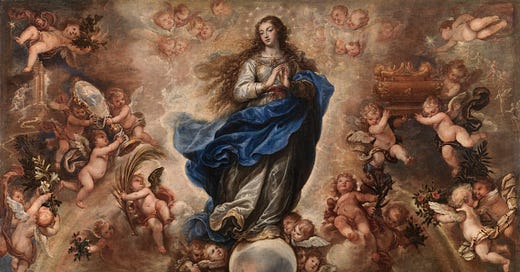I wrote this earlier this morning over my first cup of coffee, so let’s set the bar appropriately low. Honestly, that disclaimer applies to all my posts here on Substack, regardless of how caffeinated I was when I wrote them.
A Socratic Dialogue on the Immaculate Conception
Characters:
James: A Protestant who strongly opposes the Immaculate Conception.
Thomas: A Catholic who firmly defends the doctrine.
James: Thomas, I still can’t wrap my head around how you Catholics justify the Immaculate Conception. It’s not in Scripture, explicitly or implicitly. Isn’t that enough to reject it?
Thomas: Not at all, James. While I agree that the doctrine isn’t explicitly stated, it’s deeply rooted in Scripture and tradition. Let’s start with Luke 1:28. When the angel Gabriel calls Mary “full of grace”—kecharitōmenē in Greek—doesn’t that suggest she was in a state of complete holiness, free from sin?
James: It just means she was favored by God, not sinless. If she were sinless, why wouldn’t the Bible simply say that?
Thomas: Because Scripture often reveals truths implicitly. Kecharitōmenē indicates a completed action in the past with continuing effects. If Mary is “full of grace,” there’s no room for sin. That fits with Genesis 3:15, where God says to the serpent, “I will put enmity between you and the woman, and between your offspring and hers.” Mary, as the new Eve, had to be free from sin to have perfect enmity with Satan.
James: You’re reading too much into that. The “woman” is Eve, not Mary. You’re taking a poetic phrase and building a whole doctrine out of it.
Thomas: The Church Fathers would disagree with you. St. Irenaeus, for example, wrote that Mary “untied the knot of Eve’s disobedience.” Just as Christ is the new Adam, Mary is the new Eve. If she weren’t sinless, how could she undo the damage caused by Eve’s sin?
James: Even if the Fathers said that, it doesn’t make it true. Scripture is the final authority, not the opinions of men.
Thomas: But who gave you Scripture? The canon of the Bible was discerned by the Church. Without the Church’s authority, how do you even know which books belong in the Bible?
James: The Bible is self-authenticating. God’s Word doesn’t need the Church’s stamp of approval.
Thomas: Then why did Christians debate the canon for centuries? The same Church that preserved Scripture also preserved teachings like the Immaculate Conception. Christ gave the Church authority in Matthew 16:18-19: “You are Peter, and on this rock I will build my Church… I will give you the keys to the kingdom of heaven.” That authority includes the ability to define doctrine.
James: The Church can’t add to God’s Word. The Immaculate Conception is an invention, a tradition of men that contradicts Scripture. Romans 3:23 says, “All have sinned and fall short of the glory of God.” Doesn’t “all” include Mary?
Thomas: “All” can refer to humanity in general, not every single individual. Christ, for instance, is an exception, and Mary is another. God preserved her from sin by the merits of Christ’s future sacrifice, as Pope Pius IX explained in Ineffabilis Deus when formally defining the doctrine.
James: That’s circular reasoning. You’re using the Church’s authority to prove the Church’s authority. And besides, the doctrine wasn’t even defined until 1854. How can you say it’s always been true?
Thomas: The truth of the doctrine doesn’t depend on when it was formally defined. The Trinity wasn’t fully defined until the fourth century, but you wouldn’t deny it, would you? The Church defines doctrines when clarification is needed, not to invent new truths.
James: But the Bible is clear that salvation comes through faith in Christ alone. If Mary was sinless, she wouldn’t need a Savior.
Thomas: Mary herself said, “My spirit rejoices in God my Savior” (Luke 1:47). She needed a Savior, just as you and I do. The difference is that she was saved in a unique way—preserved from sin by Christ’s merits before she could fall into it.
James: That’s an unnecessary complication. Salvation is simple: all have sinned, and all need redemption through Christ. Adding Mary’s sinlessness undermines that simplicity.
Thomas: On the contrary, it magnifies Christ’s work. God’s grace is so powerful that it preserved Mary entirely from sin to prepare her to bear the Savior. The Immaculate Conception doesn’t detract from Christ’s saving work—it glorifies it.
James: I still don’t see it. This doctrine goes beyond Scripture and complicates the Gospel. I’ll stick with what’s plainly written in the Bible.
Thomas: I respect your commitment to Scripture, James, but I urge you to consider the role of the Church in safeguarding and interpreting it. Christ founded a Church, not a book, and He promised the Spirit would guide it into all truth (John 16:13). That’s why I trust the Church when she proclaims the Immaculate Conception as divinely revealed.
James: We’ll have to agree to disagree, Thomas. I just can’t accept something that isn’t taught in Scripture.
Looking for more? See Tim Staple’s article, Where Is the Immaculate Conception in the Bible?





I’ve actually never heard the Immaculate Conception defined this way. I struggle with accepting the teaching, but this actually really helped that along. Thanks, Matt.
As a protestant, I felt that this was a charitable dialogue. God Bless